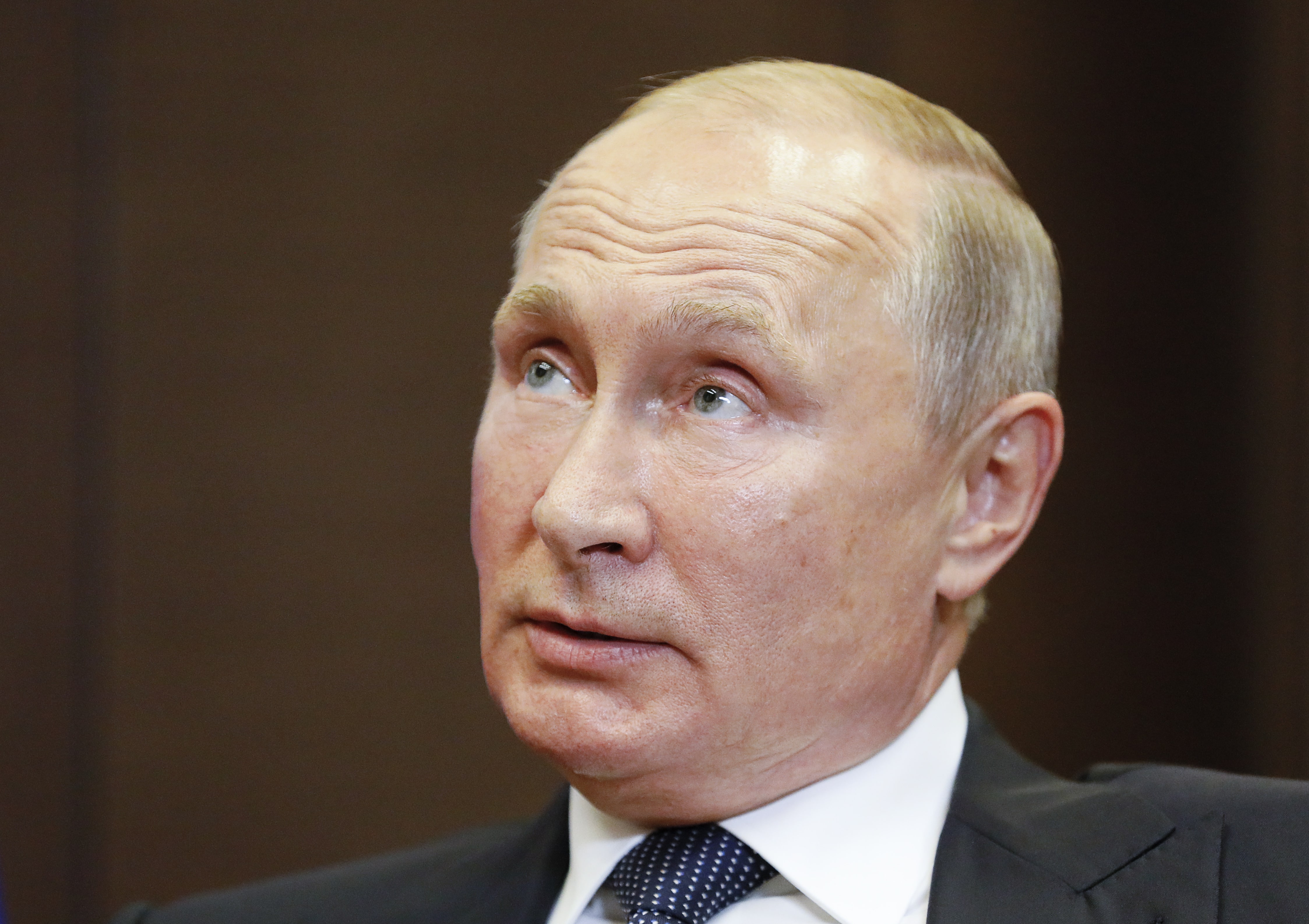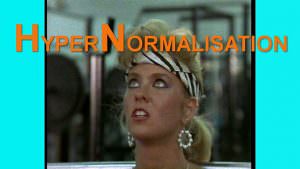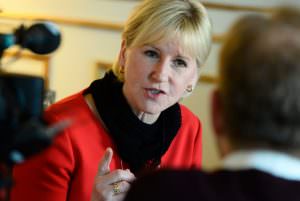Russia Sees Its Reflection in the West
"This Is Not Propaganda" author Peter Pomerantsev explores how authoritarian regimes and far-right movements have weaponized free speech. Russian President Vladimir Putin. (Shamil Zhumatov / AP)
Russian President Vladimir Putin. (Shamil Zhumatov / AP)
Consider them dispatches from a present with no future.
Earlier this month, Germany’s Alternative für Deutschland (AfD) made significant gains in two key state elections, finishing second in Saxony and Brandenburg, respectively. In 2017, it became the first far-right party to enter the Bundestag in nearly 60 years. According to a CNN report, AfD campaigned on a slogan of “Wir sind das volk” (“We are the people”)—a willful manipulation of the rallying cry that united demonstrators in the city of Leipzig on Oct. 9, 1989, one month before the fall of the Berlin Wall.
Since the bombing of the Khurais oil field and Abqaiq processing plant early Saturday morning, U.S. intelligence and Saudi Arabia have insisted that Iran is to blame. (The Iranian government denies all involvement in the incident.) “Saudi Arabia oil supply was attacked,” President Donald Trump tweeted Sunday. “There is reason to believe that we know the culprit, are locked and loaded depending on verification, but are waiting to hear from the Kingdom as to who they believe was the cause of this attack, and under what terms we would proceed!”
White House officials, without a trace of irony, have described the attacks as the country’s “9/11.” Defending his willingness to engage militarily, Trump put things bluntly: “Saudi Arabia pays cash.” (The president has since announced that he will “substantially” increase sanctions on Iran.)
Finally, Axios revealed Tuesday that with billions of dollars and the future of U.S. diplomatic relations at stake, China, Iran and Saudi Arabia could all interfere in next year’s elections—this less than a week after Israel was accused of planting “mysterious spying devices near the White House.”
When White House adviser and former campaign manager Kellyanne Conway cited “alternative facts” to defend the president’s meager inauguration attendance, she appeared to trumpet a new post-truth era of American politics. In actuality, we’ve been living in this epoch for some time, and Trump’s rise was but one expression of a larger crisis that the emergence of parties like AfD, National Rally in France and Fidesz in Hungary suggests will continue to roil the West. As journalist and television producer Peter Pomerantsev writes in a recent essay adapted from his new book, “This Is Not Propaganda,” we are living in an age of unreality:
Ideas replaced with feelings. A radical relativism that implies truth is unknowable. Politicians who revel in lying openly, shamelessly, as if being caught out is the point of politics. The notion of the people and the many redefined ceaselessly, words unmoored from meaning, ideas of the future dissolving into nasty nostalgias with enemies everywhere, conspiracy replacing ideology, facts equated to fibs, discussion collapsing into mutual accusations, where every argument is just another smear campaign, all information warfare … and the sense that everything under one’s feet is constantly moving, inherently unstable, liquid …
If the future has arrived, then Russia likely got there first. Pomerantsev argues that after the fall of the Soviet Union and the failures of the capitalist shock therapy that followed, the country grew increasingly amenable to a new form of politics—one that anticipated what was to emerge from the wreckage of the Iraq War and the Great Recession of 2008. Before Trump promised to “make America great again,” Vladimir Putin vowed to “bring Russia off its knees.”
“This Is Not Propaganda” explores not just the cutting-edge disinformation campaigns that are shaping our reality, but the ways our politics and media systems reinforce one another, creating a world in which “nothing is true and everything is possible.” It’s also a moving memoir about his parents’ flight from the Soviet Union in the 1970s and the evolving nature of censorship.
Over the phone, we discussed the future of free speech, the internet’s potential threats to liberal democracy and the meaning of Brexit, among other topics. What follows is a lightly edited transcript of our conversation.
Jacob Sugarman: If I can speak for Truthdig, I’d say that the publication takes an absolutist position on free speech. How do you believe recent authoritarian regimes and right-wing movements have weaponized that basic principle?
Peter Pomerantsev: The U.S. is really at the vanguard of this particular species of exploitation, where the far right [routinely] claims its speech is being stifled because it’s not allowed to say that black people are genetically inferior to whites. But I think people are maybe less familiar with how authoritarian regimes employ the same tactics. Instead of trying to constrict speech, which was the whole idea of censorship in the 20th century, they now attempt to drown out through noise. This is a new form of control, less policing the space and more about flooding it with bullshit, whether through cybermilitias or troll armies.
Russia kind of pioneered this in 2010, and it’s something that authoritarian governments and liberal democracies have in common now. So when opposition journalists in the Philippines or Mexico say, “But, hold on. This is untrue,” the answer is always, “This is a new form of expression.” Putin, [to use one example], calls them “concerned citizens or concerned businessmen.” It’s a way to subvert genuine critics. [We like to tell ourselves] that in the marketplace of ideas, better information will win out against worse information. But like so many simplistic, market-based metaphors, it’s not necessarily true. Just as you can break the actual market with junk bonds, you can mess up the free speech market with junk news.
JS: Do you believe that the internet is fundamentally incompatible with liberal democracy, or do the threats it poses, if we want to call them threats, stem from the way the web is structured and regulated? In other words, do we have a crisis of disinformation or simply one of capitalism?
PP: That’s a very good point. Certainly the way the internet has been shaped, the basic logic of it, has summoned up a certain type of politics—let’s put it that way. The way social media works at the moment is that you are rewarded for polarization and scandalization—that’s what generates clicks for ads. This is already true of television and the media, let’s be honest, but the internet just takes it to a different level. It’s almost as though the web has summoned politicians like [Italian Deputy Prime Minister Matteo] Salvini. The lack of trust and polarization it produces is causing democracies to break down, and that’s kind of the big trend everywhere.
The people whose job it is to fix that, to create public discourse, are going to have to ignore financial gain. It’s got to be some kind of civic or public actor, but probably not a state actor because we don’t want states dictating what media can and can’t be published. As a European, I do not consider this an inherently anti-capitalist idea or rather one that can’t exist side by side with more ad-based approaches. Maybe for Americans it is, and that’s kind of sad, that irony. In Britain, we have the BBC, which doesn’t carry ads but can still compete with commercial television. But the internet is currently designed to appeal to the lowest common denominator, a very crass idea of human desire. Clicks, shares, narcissism. Largely narcissism. It could be designed in a different way, and companies could reorient their algorithms.
JS: It’s just not clear to me that these companies ever will, short of the government breaking them up or making them public. I think we’ve seen that over the last couple of years with Facebook. Maybe you disagree.
PP: Well, it’s happening in Europe. The problem is a lot of nations have been very stupid and reactive so far. But they’re trying to make these companies more transparent, to [impact] how the algorithms work. It’s not very complicated. In Britain, we have a regulator whose job it is to make sure that there is enough fairness and balance on TV and the radio. So if the regulator sees there’s a lack of it, it will help support public service media. I wonder what that means in an Instagram age. I wonder whether that means supporting bodies in media whose aims are not just clicks [and] shares but to construct a dialogue. Maybe that’s a way in, to even up the pages. So I think we’ll get there in Europe; it’s just a question of not putting in bad regulation first. America is just, you know, mad. The problems are so obvious, and I don’t know exactly what’s going to fix them.
JS: Obviously the delivery systems have evolved, but are these disinformation campaigns themselves really anything new? What is the difference, to your mind, between manufacturing consent, which Noam Chomsky identified decades ago, and manufacturing consensus, which is something you explore in the book?
PP: They’re actually very similar things. So [German political scientist] Elisabeth Noelle-Neumann, who’s a very important person in the study of media effects, came up with the [theory] of “the spiral of silence,” which is basically the idea that most people cleave to the majority and their attitudes to fit in. It’s a very glum view of humanity, and one that [makes more sense] when you go into her own story. She had sort of gone along with Nazi Germany, so in some ways, she was talking about herself. But her theory is one that has been borne out by a certain amount of social science and research. In a way, we’re kind of replicating that [on the internet]. This is [yet another] iteration of an old psychological principle.
What’s new is that where before the media was [used to exert] ideological dominance and control, now that’s impossible. It’s very hard to have full hegemony over the internet. Increasingly, the approach is to listen to people and sync your agenda [accordingly]. The more people talk on social media, the more they reveal about themselves and the easier they are to manipulate. During the 20th century, self-expression was a way of standing up to power. Now it isn’t necessarily, and I think that is a big change.
JS: But aren’t there certain limits to the efficacy of these influence operations? In Argentina, where I’m based, President Mauricio Macri just lost a primary election by 15 points amid a deep recession. And while his party has repeatedly denied the claim, Macri has been tied to Cambridge Analytica, the data-mining firm behind the Brexit and Trump campaigns. Jair Bolsonaro, who helped radicalize Brazil via WhatsApp, has similarly seen his approval ratings collapse following a series of corruption scandals. Don’t these governments eventually collide with physical reality?
PP: I confess I don’t know much about Latin America, so I don’t want to say something foolish, but the fall [of these governments] doesn’t mean the government that replaces them will be stable either. I think the nature of these campaigns is that they can’t hold very long. They’re situational. Take the Five Star party in Italy. In many ways, it was a digital movement; it galvanized [voters], and then it fell apart very quickly.
The Brexit campaign [in the U.K.] won because it was so heterogenous, and the Conservative Party made the false assumption that it was all about nationalism and immigration. That was one of the reasons [people voted leave], but it wasn’t the only one. They’ve focused on a single issue, and they haven’t done very well. We see the same thing with Trump in the U.S. Democrats are trying to trap him in that white nationalist space, and he’s [constantly] moving towards and away from it again, because he knows he can win if he holds onto suburban moms. That’s sort of the game.
JS: I’m glad you brought up Brexit, as one of its campaign’s central claims was an outright fiction. Where do you ultimately place it in this larger global crisis, and what do you think someone like [British political strategist] Dominic Cummings actually wants?
PP: Part of Brexit is Britain’s 500-year-old schizophrenic relationship with Europe, and its notion of its own exceptionalism. That goes all the way back to Henry VIII and maybe Henry V, to the Shakespeare we’re brought up with in school, so [in some ways] this is a very old story. But you’re right that the “leave” campaign was something new. Cummings, who led leave, is interesting, because he’s very focused on digital. He basically thinks everything from the 20th century, from our parties to our systems of governance, are completely [outdated], and that when the next big crisis hits, the British and European governments of slow, representative democracy and broadcast media are just not ready. He’s not so great at articulating what comes next, but he’s good at reminding everybody we’re not prepared. Silicon Valley people say very similar things, don’t they? That bureaucracies and the legacy media are ill-suited for the 21st century.
JS: In what ways has Putin’s rule anticipated the West’s own slide into authoritarianism? Why did the future arrive first in Russia, as you argue in the book?
PP: I left Russia in 2010 because I was exhausted of doing interviews in a post-democratic regime, where the idea of truth had been put into so much question that it took away the grounds of criticism. There was no idea of the future, just these weird nostalgias. It was a very liquid approach to ideology; if you weren’t part of an [ever-evolving] majority, then you were battered. I grew exhausted with this kind of politics, and I moved back to London. Several years later, I saw the same pathologies and propaganda come through here. It was both funny and worrying. So I wrote the book to understand why I was seeing various versions of what I saw in Russia. What was the pattern behind this?
Long story short, I don’t think it’s much of a mystery. The paradox is that by losing the Cold War, Russia arrived earlier to the place we’re all arriving now. The necessity for a fact-based political discourse existed in the 20th century because you had various types of enlightenment projects, communism and democratic capitalism, who were each competing over which version of the future was better and more attainable. They needed evidence to show that they were getting there. The Soviets lied all the time, and they had a warped attitude toward reality, but they still had to go through the motions of making themselves sound scientific and fact-based because Marxism-Leninism was a scientific theory of history. They had all these institutes trying to prove that they were doing well, to make their lies sound factual. And as long as [these economic systems] were in competition [with each other], you had a discourse you could engage with, more or less.
So in Russia, communism crashes in ’89 and again in ’91. By ’93, people have lost faith in a caricature of democratic capitalism, but one that was the opposite of the communism they experienced. People are left with a sense that there is no future. They live in a world where all the old identities and certainties have gone, and a new breed of politician starts to find a way to negotiate, to win elections, to sway public opinion in this new place where facts don’t really matter. There’s this kind of liminal release in saying, “Fuck off to facts.” Populism becomes a strategy even before Putin gets on the scene. Politicians like Vladimir Zhirinovsky are constructing an idea of the people because all the old ideologies of left and right have [collapsed] and they need new ways of formulating coalitions. Conspiracy becomes the defining idiom to explain the world.
JS: Can you explain how the Iraq War and the economic crash of 2008 helped create the conditions for an American society in which “nothing is true and everything is possible,” to borrow you borrowing from Hannah Arendt?
PP: I think Iraq is important in so many ways. In the book, I talk about the power of metaphors and the sight of Lenin and Stalin’s statues being lifted up in ’89. They’re iconic images that say so much about how we’re all moving toward a more democratic world. Then we see Saddam Hussein’s statue torn down in Baghdad, and it doesn’t lead to prosperity and great democracy. It leads to horrific civil war, which kind of negates that imagery. Obama has spoken about the arc of history, but those words probably ring hollow now. And then the 2008 financial crisis undermined the idea [that] we were all moving to a utopia of market-driven globalization.
JS: I keep returning to the question of cause and effect. Is someone like Donald Trump really shaping our reality, or is he just a spectacular manifestation of what the documentarian Adam Curtis calls “hypernormalisation”—the notion that we’re already living in a fake world, where we know the people in power are lying to us, but we simply can’t imagine an alternative?
PP: In my first book, I didn’t use Putin’s name, I just called him “the president.” So I see these politicians as expressions of the structure of media and larger historical narratives. Now, I’m [sympathetic] to the arguments of journalists like Arkady Ostrovsky, who argue that Putin is uniquely talented. I don’t think you can discount these [different] personalities, but I still believe that they tell us something deeper about society and media, which I’m fascinated by, having been a TV producer for my sins.
I know it’s unfashionable to talk about in absolutist terms, but evil will always find a way of expressing itself. What’s interesting to me is the way it expresses itself now—why a Trump is possible rather than what Trump made possible. Let’s be honest: The people elected him. However dodgy his campaign was, there was a demand there. Part of that is because of his career in reality shows, but, as you say, we see variations of him in so many places. So it can’t just be him. There is something more structural going on.
JS: Finally, if words like peace and democracy are slowing being stripped of meaning, how do we begin to claw them back?
PP: That’s a great question. Listen, I think there’s a lot that we need to do. After the fall of communism, we told all these new democracies that to have a democratic information space, you needed freedom of expression, a pluralistic media and public service media. And I think we have to admit that they’ve all taken a bashing. Freedom of expression we’ve discussed; pluralism doesn’t always lead to better debate, it can tumble into hyperpartisan polarization where debate breaks down; while the the idea of the public service has taken a philosophical battering, where you have propagandists in both the U.S. and Russia saying, “Well, there’s no such thing as balance,” or that “objectivity is just a myth bestowed upon us,” in the words of Russia’s top current affairs presenter. This premise is then used to throw editorial standards into the bin.
I do believe there are things we can [achieve] through regulation, not of content but of the companies themselves. At the moment, we don’t understand if something is organic or part of a campaign, or who’s behind these different websites. But we don’t have to [sacrifice] our First Amendment ideals. If anything, I would argue that the closed nature of the means of production on social media is a form of censorship itself. And maybe with greater transparency and an understanding of the dynamics of echo chambers, can we start talking again to each other, rather than [to] somebody who may or may not be a bot.
Your support matters…Independent journalism is under threat and overshadowed by heavily funded mainstream media.
You can help level the playing field. Become a member.
Your tax-deductible contribution keeps us digging beneath the headlines to give you thought-provoking, investigative reporting and analysis that unearths what's really happening- without compromise.
Give today to support our courageous, independent journalists.




You need to be a supporter to comment.
There are currently no responses to this article.
Be the first to respond.